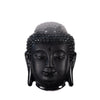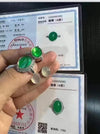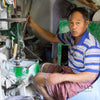Dyed Jade Bangles in Myanmar
Background
Traditionally the Burmese never treated their Jadeite products. Most of the treatments are done after the Jadeite has been exported to countries like China, Taiwan and Hong Kong. That's until recently (in the last couple of years), treated Type (Grade) C Jade bangles started appearing in the Myanmar Jade Market. These bangles have been dyed to enhance their colour. B type treatments are yet to been seen, fortunately. As of 2019, the whole market it flooded with these dyed jade bangles as if they are the new norm. Sellers claim dyeing the jade bangles adds value to their products and the buyers do prefer greener bangles at low prices.The effect is simple but damaging to the industry; the introduction of dyed bangles make the natural coloured bangles look significantly less attractive yet, the price gap is small. The buyers would always go for the greener bangles and the naturals are left unsold. Hence, the domino effect.
Detection of Type / Grade C Jadeite
Grade or Type C treatments are easier to detect than the polymer impregnated B type Jade. A trained eye can detect traces of these dyes with the use of a light and a 10x gemological loupe. Some dyeing method are more advanced and are harder to detect but still possible with experience and training.
The Price of Treated Jade Bangles
After analysing hundreds of bangle prices in the market, on average, the dyed jade bangles increase their value by 30-40% compared to the natural untreated counterpart. This doesn't mean that dyed bangles are higher in value. It's just the apparent value created by the enhanced colour. The colour will fade over time. These prices are for the knowing customers in the trade who buys these bangles as Type C. If an unsuspecting customer view the bangle as Grade A Jade, they could have a apparent value 300-400% more than its untreated natural counterpart.
The Treatment Process
The exact science and materials used on this particular treatment method is not known because such knowledge is kept with a level of secrecy within the trade. Below, I will explain my analyses of the treatment process.

The treatment is fairly simple and takes advantage of the porous nature of Jadeite. The granular crystal structure of jadeite creates minute openings (pours) on the surface that allow the dyes to seep in easily. Workers wearing plastic gloves (like the ones used in food handling) to wipe concentrated dyes onto the entire surface of the jade bangles. The use of the gloves may indicate the corrosivity of the dye concentrate which is likely to be of acid-based or perhaps they just don't want to get their hand dirty.

After the dyes are wiped on, they let the bangle sit in open air for roughly an hour allowing the colours to be absorbed into the jadeite. Another worker then begins to wipe off the residue dyes on the surface using a roll of tissue paper. The treatment process is complete.
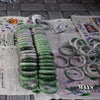
On the far right are jade bangles that are about to be dyed. On the left of that pile are already dyed Jade Bangles stacked in an orderly fashion, ready to be wiped off with tissue paper. Take note of the difference in saturation of colour.

Here, a skilled worker paints dyes on to the jade bangle using a cotton bud. This allows him to precisely create natural looking colour veins and colour patterns.
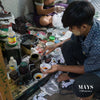
A young man draws out dye concentrates into cups from the mixing station.
Conculsion
This type of treatment for Jadeite bangle only started to appear a few years ago and is now becoming the norm in the Myanmar Jade Market. Treated jade bangles are easily detectable by a trained eye with the use of a few gemological instruments. This type of practice is slowly causing damage to the Burmese jade industry.
Do you sell treated or dyed jade bangles?
Absolutely not. We conduct these types of research and studies so that we can provide 100% genuine natural products to our customers.
How long does the treatment last?
The dyes are far from permanent. Many of the sellers and the treatment factory themselves claim that the dyes will only last three weeks. This is likely to be true if the bangle is worn on a daily basis. In actual fact, the dyes will last several month if the bangles are not worn as I have acquired a few to keep as sample and their colours are still in tact after four months as of this writing.
What colour are the dyes?
At the present moment, there are only two primary colours used in the dyeing of Jade bangles in Myanmar: Green and Lavender. The two most expensive colours of Jadeite.
Can the dyes be removed?
Yes and no, the colours can be easily removed by wiping the jade bangle with a cotton cloth soaked with a solvent like acetone within a few hours of the treatment, however, if the dye has been set for a period of time, the dyes will not easily come off.
What is in the dye?
The exact solution used is not known to me but based on past literature and general market speculation, the dyes are acid-based. If the dyes are not removed after long periods of time, the acid within the dyes can cause corrosion to the jade bangle.

WAI YAN


